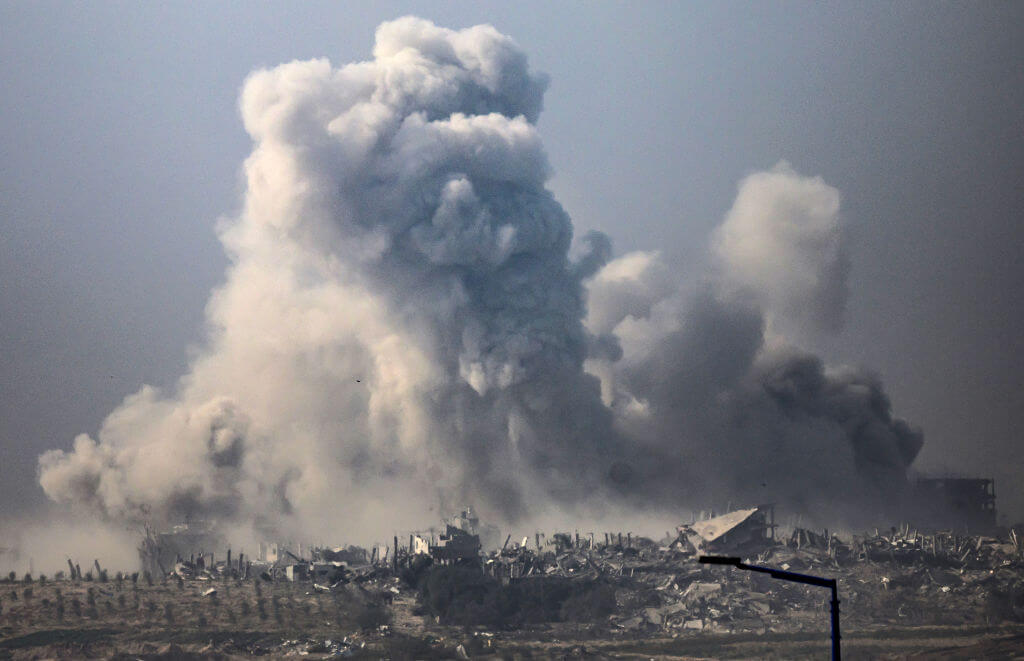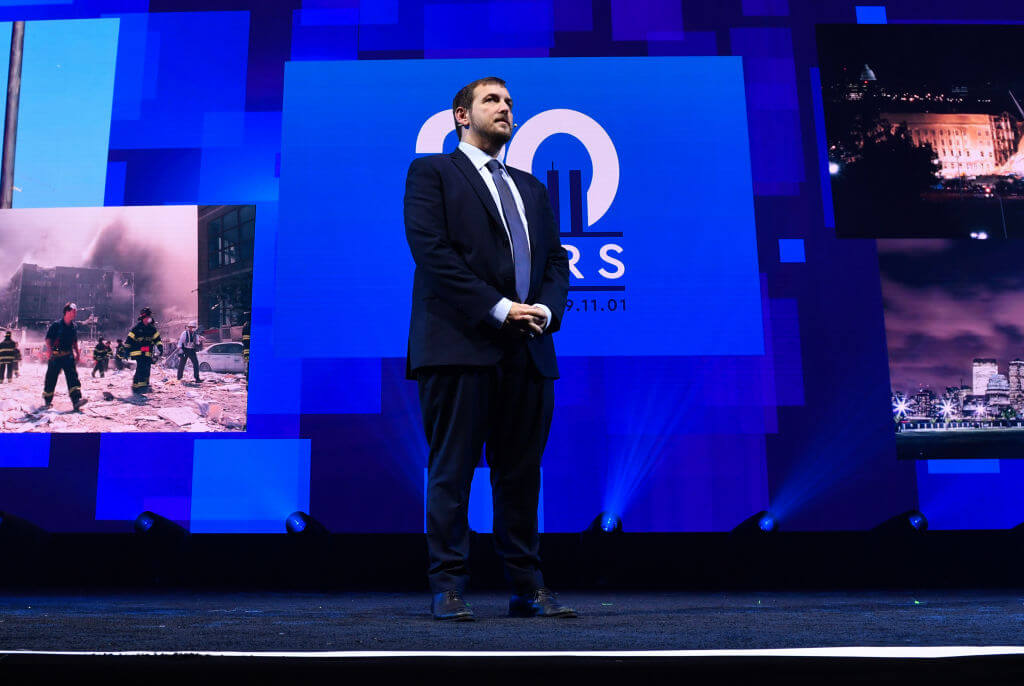Israel’s representative in New York resigned to protest Netanyahu. Now he’s got some tough words for liberal New York Jews.
Asaf Zamir, the former Israeli consul, said he offered to return to his old job to help with public diplomacy after Oct. 7

Israeli air strikes in the Gaza Strip on Dec. 4, 2023. Photo by JOHN MACDOUGALL/AFP via Getty Images)
Asaf Zamir, the former Israeli consul general in New York, resigned in March rather than support the Israeli government’s judicial overhaul plans. But he said some New York liberals are misguided in their opposition to Israel’s offensive in Gaza, which has resulted in massive civilian casualties.
Zamir, a Tel Aviv resident who is running for deputy mayor in upcoming municipal elections, singled out the progressive New York Jewish Agenda for supporting a statement signed by six Jewish elected officials saying they are “deeply distressed” by the military campaign and approach being taken by the Netanyahu government in Gaza.
“When you take that stand, you are basically saying that Israel has a right to defend themselves, but can’t do it in the way every other government in the world would,” he said, during a calling it an “anti-Israel” position.
Zamir, now at the end of a five-day visit to the U.S., suggested that the same group would have condemned Israel had it acted in advance to thwart Hamas’ plan to kill and kidnap thousands of Israeli civilians. “We literally have to be raped and die and kidnapped before we have the right to retaliate,” he said.
These critics, he said, should balance their sympathy for the Palestinians in the West Bank and Gaza with an understanding of Israel’s need to root out a terror network that has promised to attack again.
Phylisa Wisdom, NYJA’s executive director, said that at a “moment of real rising anti-Zionism and antisemitism” it was “both baffling and short-sighted that an Israeli leader would attack supportive progressive Jewish elected officials and organizations in the diaspora.” She said the group is aligned with President Joe Biden’s approach, supporting Israel’s right to defend its borders and citizens while expressing real concern over Palestinian civilian casualties.
An offer refused
After Hamas attacked Israel on Oct. 7, the onset of Israel’s campaign in Gaza and the subsequent surge in antisemitic attacks targeting Jews in New York, Zamir made an usual offer to Israel’s government: to fill the yet unfilled consular job for a short period of time, unpaid.

He said proposed working within the government of Israeli Prime Minister Benjamin Netanyahu again because Israelis of all political stripes needed to pull together since the attack. Amid the mounting calls for a permanent cease-fire in the U.S., he thought he could be of help, but said he was not surprised that the government declined his offer.
It was not the Netanyahu-led government but its predecessor that selected Zamir as Israel’s representative in New York in 2021. He resigned amid spontaneous mass protests across Israel following the firing of Defense Minister Yoav Gallant for refusing to support the government’s judicial overhaul, which had riven Israeli society, with many considering it a blueprint for undermining democracy and further empowering right-wing parties.
Zamir has kept himself in the public eye since his resignation. In addition to running for office, he has increased his engagement on social media, conducting webinars with Jewish leaders and student organizations. And he recently returned to New York to speak with Jewish leaders and media.
Zamir said he is trying to rekindle efforts he launched during his tenure as consul to reconnect younger, more liberal-leaning American Jews to Israel — particularly those who had distanced themselves from it because they disliked Netanyahu’s policies.
He said he sees American Jews who, still shocked and heartsick over Hamas’ massacres on Oct. 7, now feel hesitant to speak up for Israel because of the casualties in Gaza and the protests against Israel rocking American college campuses. Physically distant from Israel, he said, they struggle to fully comprehend the complexities Israelis face.
He said he’s aiming, in his five-day visit to the U.S., to help younger American Jews understand what happened on Oct. 7 and why Israel must root out Hamas.
Higher expectations
Zamir himself affiliates with the left in Israel. He said he has consistently voted for left-leaning parties and as a teenager played an active role in the International Center for Peace in the Middle East, a group comprised of both Jews and Palestinians. “But it’s so clear this time that you have to be very cynical not to call it out as it is,” he said.
At the start of the war, Zamir said he was pleased by Jewish Americans’ support for Israel, and in particular their work to push back against fringe progressive criticism of Israel and politicians’ and celebrities’ failures to condemn Hamas. But he said that in recent weeks, progressive American Jews, trying to maintain their standing in progressive circles, have been far quieter on Israel’s behalf. Many, he said, are condemning not just Hamas, but Israel.
“Opting for a middle path during times of war is making a choice,” Zamir said. “Just like not voting for any candidate implies supporting the one you dislike. Saying both sides are not okay is giving a prize to the bad guy.”
Zamir said he’s worried that people will forget Oct. 7 in a few months and may revert to blaming Israel for antisemitism in the Diaspora. He suggested that Jewish Americans should follow President Joe Biden’s approach to the war, and fully support Israel’s right to self defense.
“I guess he knows something you guys don’t,” he said.
This post was updated to include a statement by the New York Jewish Agenda.
















